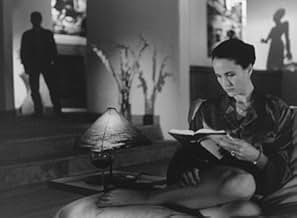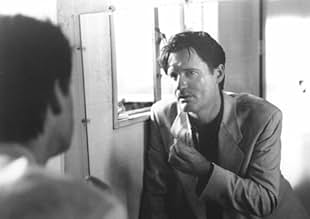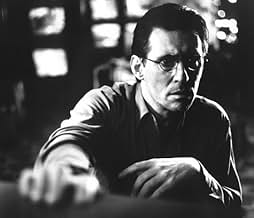IMDb RATING
5.6/10
5.5K
YOUR RATING
Mike is a successful Hollywood producer of violent movies. Then he himself experiences extreme violence, goes missing, joins some Latino gardeners and reviews his life.Mike is a successful Hollywood producer of violent movies. Then he himself experiences extreme violence, goes missing, joins some Latino gardeners and reviews his life.Mike is a successful Hollywood producer of violent movies. Then he himself experiences extreme violence, goes missing, joins some Latino gardeners and reviews his life.
- Awards
- 1 win & 4 nominations total
Nicole Ari Parker
- Ade Kenya
- (as Nicole Parker)
Samuel Fuller
- Louis Bering
- (as Sam Fuller)
Featured reviews
How 'bout a four? Visually, there are some great moments. I think the most interesting scenes are those where there is no dialogue but the camera follows the characters as they inwardly contemplate what this all means (Bill Pullman, Andie McDowell). Unfortunately, we as the viewers are also given (too much) time to contemplate what it means. Everything is WAY too understated. The movie slows to a stop in many places. You start to like it (the romance with Kat and the investigator, the interaction of Bill Pullman's character and the Mexican-American people) and then it doesn't follow through. The dialogue at the film school, in which the characters give a monologue for a class is probably the most interesting dialogue. Some rap, some tell a story, some recite their own poetry. That was the most moving part of the movie. While Wenders has a important point to make, it doesn't come through clearly and the viewer is left uncaring, uninterested. Maybe the only thing that could have helped the End of Violence is more good ole fashioned...violence <g>.
This is an astounding movie, and as others have noted, it is precisely the kind of movie that passes most people by because it rocks so gently as to be almost imperceptible.
The first time I saw this, I was disappointed. 'Until the End of the World', to me, is a brilliant piece of work, with more beauty, reverie, and complexity than any ten average films put together.
So...I was ready for some heady stuff with 'End'. But the movie seemed to be lost, missing in action.
But six months later I watched it on video, and I realized I was looking at an entirely different movie.
Then I watched it again...and again, and again, until I'd seen the thing ten times, including one where I only listened to the film, to see if I was simply addicted to Wim's luminous visuals.
What you realize is that this film is cooking up some very threatening ideas about the quality and nature of love, and the companion six degrees of violence and hatred. It is really about the way in which fear and love pulse in contrary and similar ways, much like particle and wave, dancing together.
It's also a fantastic critique the "confederacy of dunces" and the manner in which we manufacture enemies to suit our paranoia.
I must say that there are few directors that move me as much as Wim Wenders, and I have to confess that I have cried many times over the beauty and grace of some of the scenes and visuals in this movie. Much like Robert Altman or Atom Egoyan, Wenders cares about people, believes in their struggles, and he creates tension that moves them, at least temporarily, to understand their natures more fully.
A masterpiece, if a masterpiece means your heart moves even slightly...
PS Ry Cooder's soundtrack is brilliant!
The first time I saw this, I was disappointed. 'Until the End of the World', to me, is a brilliant piece of work, with more beauty, reverie, and complexity than any ten average films put together.
So...I was ready for some heady stuff with 'End'. But the movie seemed to be lost, missing in action.
But six months later I watched it on video, and I realized I was looking at an entirely different movie.
Then I watched it again...and again, and again, until I'd seen the thing ten times, including one where I only listened to the film, to see if I was simply addicted to Wim's luminous visuals.
What you realize is that this film is cooking up some very threatening ideas about the quality and nature of love, and the companion six degrees of violence and hatred. It is really about the way in which fear and love pulse in contrary and similar ways, much like particle and wave, dancing together.
It's also a fantastic critique the "confederacy of dunces" and the manner in which we manufacture enemies to suit our paranoia.
I must say that there are few directors that move me as much as Wim Wenders, and I have to confess that I have cried many times over the beauty and grace of some of the scenes and visuals in this movie. Much like Robert Altman or Atom Egoyan, Wenders cares about people, believes in their struggles, and he creates tension that moves them, at least temporarily, to understand their natures more fully.
A masterpiece, if a masterpiece means your heart moves even slightly...
PS Ry Cooder's soundtrack is brilliant!
I watched this movie a few times, and I have met very few people who liked it as much as I did. I see it as an artful expression of all the critical thoughts in philosophy, sociology etc. that show how genocide, ultra-violence and fascist methods of population-control can develop out of all the promises of order, justice and peace the the modern state makes to its citizens. Also, the dialogue has absolutely superb moments, as when Mike the fugitive of the state says to his wife confronts his ex-wife with the words "Who can I turn myself into? Well I see who you turned yourself into...". A lot of people seem to dislike the loose ends and unexplained shifts that the characters make - but I say, in that very absence of rigid structure the film makes a parallel to the manifest ambivalence of modern life as a citizen: Our greatest protector is also our greatest threat.
I'm not surprised that a child would not understand this movie. To me it was very meaningful, but only in terms of lived experience in jobs and politics. It's really "Brave New World," where authority figures keep order by putting up cameras everywhere and intervening to eliminate anyone who is disorderly or criminal. Violence is a huge preoccupation, but only tolerated as make-believe -- but the make-believe gets confused with real violence. Control, transgression, power are the pivots of the well-to-do. Ashcroft stuff.
But the Mexican and immigrant families offer a warmer, truer alternative. In the end, they are more powerful because they are free and can think. The Kinko's episode, in which the police are defeated from taking control by their own preconceptions, is a good example. As underlings, laborers, the Mexicans understand what's at stake and they are everywhere, invisible to their employers.
The intellectual technician doesn't catch on until it's too late.
I'm told that what I saw was a re-cut and that the early version was indeed chaotic with a lot of loose ends. All I can say is that now this is one of the videos I rewatch and ponder.
But the Mexican and immigrant families offer a warmer, truer alternative. In the end, they are more powerful because they are free and can think. The Kinko's episode, in which the police are defeated from taking control by their own preconceptions, is a good example. As underlings, laborers, the Mexicans understand what's at stake and they are everywhere, invisible to their employers.
The intellectual technician doesn't catch on until it's too late.
I'm told that what I saw was a re-cut and that the early version was indeed chaotic with a lot of loose ends. All I can say is that now this is one of the videos I rewatch and ponder.
A film producer who escapes death by murder and chooses to lead a simple life afterwards, a group of good Mexican gardeners, a second-rate movie actress who becomes jobless, a police officer who is not happy with the filing of his case, a Salvadoran maid whose family has been shot by death squads, a NASA employee who knows too much and his old father who doesn't want to exchange his old typewriter by a computer, a mysterious project of ending up violence in the world by putting everyone under surveillance, with all those ingredients what could a movie director have made? Surely an excellent movie. This one however is too much ambitious and produces rather poor results in comparison with that ambition. Where the contrast between dream and reality, love and greed, poetry and vulgarity could have been explored we are left with a story not bad in itself but not very deep and not especially moving.
Did you know
- TriviaThere is a scene in the film where we see a live recreation of the painting "Nighthawks" by Edward Hopper.
- GoofsWhen Page is holding Mike at gunpoint she holds the gun upward with the bottom of the handle facing outward and the ammo clip is clearly missing. Yet when Mike exits through the patio door she fires the gun and shatters the glass.
Obviously there was a bullet in the chamber.
- SoundtracksBailare (El Merecumbe)
Written, Performed and Produced by Raul Malo
Courtesy of MCA Records, by arrangement with Universal Music
Special Markets
- How long is The End of Violence?Powered by Alexa
Details
- Release date
- Countries of origin
- Languages
- Also known as
- El final de la violència
- Filming locations
- Griffith Observatory, 2800 E Observatory Rd, Los Angeles, California, USA(Multiple interior and exterior scenes; as Ray Bering's workshop. Hillside hike viewpoint just south of observarory)
- Production companies
- See more company credits at IMDbPro
Box office
- Budget
- $5,000,000 (estimated)
- Gross US & Canada
- $386,673
- Gross worldwide
- $386,673
- Runtime
- 2h 2m(122 min)
- Color
- Sound mix
- Aspect ratio
- 2.35 : 1
Contribute to this page
Suggest an edit or add missing content








































